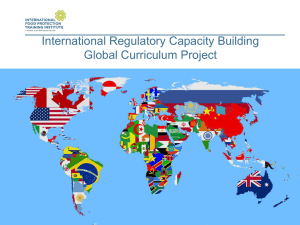Unit 2 - National Union of Teachers
advertisement
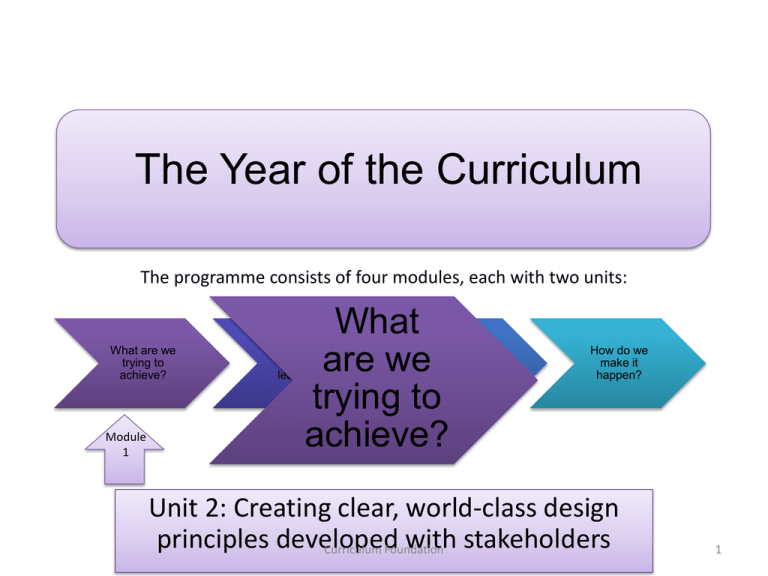
The Year of the Curriculum The programme consists of four modules, each with two units: What are we trying to achieve? Module 1 What are we trying to achieve? How shall we organise learning? How shall we evaluate success? How do we make it happen? Unit 2: Creating clear, world-class design principles developed with stakeholders Curriculum Foundation 1 This Unit Unit 2 Title: Creating clear, world-class design principles developed with stakeholders In this unit you will learn how to convert aims and values into the curriculum principles which will provide the foundations for your high quality curriculum, taking account of key competencies. © Curriculum Foundation 2 By the end of this second unit of module 1 you will: • have explored the building blocks of the curriculum and the debates concerning recent trends in curriculum development Go to section 2A • have a clear understanding of the place and importance of competencies in a 21st century curriculum Go to section 2B • know how to engage stakeholders in developing curriculum principles and how to ensure the school’s principles provide designers with firm foundations for a quality curriculum Go to section 2C © Curriculum Foundation 3 “The No school prizes for recognising curriculumthis must man. But prepare what did young he say people about the for school an uncertain curriculum? future.” ? “To do this, we need the traditional subjects, but we also need young people to develop the key competencies that will enable them to cope with life in the 21st Century.” © Curriculum Foundation 4 In the first unit, we were looking at how we can prepare young people for the future. In this unit we shall explore these “Key Competencies” that Mandela mentioned. What are they? How do we build them into the curriculum? But first some thoughts about ‘curriculum planning’ and ‘curriculum design’, and then a look at what we use to design a curriculum. © Curriculum Foundation 5 Curriculum Planning Planning can often mean making a list of all the things that pupil should learn and making sure they are in the right order. Not everyone looks forward to planning meetings! © Curriculum Foundation 6 Curriculum Design Design is about constructing the learning experiences that pupils will need in order to learn those things. It is about ensuring that those experiences are effective and compelling in themselves and that the sum total of the experiences adds up to a coherent and worthwhile programme that meets the ends that we seek. Design is much more interesting. © Curriculum Foundation 7 The ‘Building Blocks’ of a curriculum: What is a curriculum made of? © Curriculum Foundation 8 The ‘building blocks’ of the curriculum: Knowledge Possession of information Skills Ability to perform mental or physical operation Understanding Development of a concept: putting knowledge in a framework of meaning © Curriculum Foundation 9 Look at the following two questions and one instruction. Are they asking for knowledge, skills or understanding? What is the capital city of France? Find out what is the capital city of Mongolia. Why is New York not the capital of the USA? © Curriculum Foundation 10 Here are the answers. What is the capital city of France? To answer this question, you need knowledge. You need to be able to When look curriculum documents is often helpful look at Yes,aitwe was too easy really. However, weitdo need to bear to these recall piece of at information. the verb thatin introduces thewe learning distinctions mind when design expectations. a curriculum. Find out what is the capital city of Mongolia. Knowledge expectations words suchtoas: know that, The types of experiencesoften that start pupilswith need in order acquire identify, state, knowledge arename, quite different from theneed onestothey needtotoperform acquirean This requires you to doetc something. You be able skills. YouIncan people information they to practise skills. operation. thistell case to look something– up in have an atlas, or google it, or Skills expectations tend to start activekind. verbs: investigate, carry ask someone. This requires a skillwith of some out, explore, construct, etc being able to put knowledge in a Understanding comes from framework of meaning. Knowledge is essential to understanding, Why is New Yorkunderstanding not capital USA? Understanding expectations tendthe to start with ways ofthe demonstrating but knowledge without would beof merely that understanding: explain,Arecognise etc. knowledge would be disconnected information. collectionwhy, of such This requires you to understand something in order to explain it. You the curriculum of the pub quiz.know – it’s Ulaan Baatar In case you need to have acquired thedidn’t concept of a capital. You need to have to put your knowledge into a framework of meaning . © Curriculum Foundation 11 Look at some of the learning outcomes you have written recently, or that are contained in your curriculum planning. How many of these are about: • • • Knowledge? Skills? Understanding? What was the proportion of each? Are you happy with the proportion? What do you think about the proportion of each in the new National Curriculum? We shall return to this issue later. © Curriculum Foundation 12 For many years, we thought of the curriculum in terms of knowledge, skills and understanding and we designed learning experiences suitable for each. Recently, a debate has arisen around the notion that knowledge is more important than skills. Or that skills are more important than knowledge if you are on the other side of the argument. So, which is more important? Which side are you on? Have you put your vote in the box? Knowledge Skills © Curriculum Foundation 13 Yes,Do it’syou E.D.recognise Hirsch. this man? He has been very influential in the debate Did you notice the sub-title? says: about knowledge versusItskills. “What every American needs to know”. Not “What every American needs to be able to do, or to understand”. This book has been taken to argue the primacy of knowledge over skills, and many people have jumped on the bandwagon. You may recognise the next person. © Curriculum Foundation 14 “ Our problem is that we have an education system that elevates the acquisition of skills over the passing on of concrete knowledge.” © Curriculum Foundation 15 ED Hirsch took his ideas into a set of school books – one for each grade 1-12. If you look inside these, they are lists of facts (mostly about the USA). The idea has been taken up in England as well: © Curriculum Foundation 16 Of course, the English versions have more of a bias toward English facts, but they are still mainly lists of facts. This not to condemn them. We should reserve judgement at this stage. The followers of ED Hirsch believe that facts are the most important aspect of learning, and see them as the key to breaking the cycle of deprivation that means that pupils from poorer homes tend to do worse at school than those from wealthier backgrounds*. Hirsch based his thoughts on a wealth of experimental evidence. We’ll come back to this – but first, look at the first draft of the new English National Curriculum. These were the draft History Programmes of Study for Key Stage 2: *You can see and hear Prof Hirsch explain this himself at: http://www.youtube.com/watch?v=N4Xf7LtN-Yg © Curriculum Foundation 17 2013 Consultation draft of English National Curriculum Key Stage 2 History Programmes of Study • • • • • • early Britons and settlers, including: • the Stone, Bronze and Iron Ages • Celtic culture and patterns of settlement • Roman conquest and rule, including: • Caesar, Augustus, and Claudius • • Britain as part of the Roman Empire • the decline and fall of the Western Roman Empire • Anglo-Saxon and Viking settlement, including: Heptarchy • the the spread of Christianity • key developments in the reigns of Alfred, Athelstan, Cnut• • and Edward the Confessor the Norman Conquest and Norman rule, including: • • the Domesday Book • Feudalism • Norman culture the Crusades • Plantagenet rule in the 12th and 13th centuries, including: • key developments in the reign of Henry II, including the • murder of Thomas Becket Carta • Magna • de Montfort's Parliament relations between England, Wales, Scotland and France, including: William Wallace • Robert the Bruce • Llywelyn and Dafydd ap Gruffydd • • • the Hundred Years War life in 14th-century England, including: • Chivalry Black Death • the the Peasants’ Revolt • the later Middle Ages and the early modern period, including: Chaucer and the revival of learning • Wycliffe’s Bible • • Caxton and the introduction of the printing press Wars of the Roses • the Warwick the Kingmaker • the Tudor period, including religious strife and Reformation in the reigns of Henry VIII, Edward VI, and Mary Elizabeth I's reign and English expansion, including: • colonisation of the New World of Ireland • plantation conflict with Spain • the Renaissance in England, including the lives and works of individuals such as Shakespeare and Marlowe the Stuart period, including: • the Union of the Crowns versus Parliament • King Cromwell's commonwealth, the Levellers and the Diggers • • the restoration of the monarchy Great Plague and the Great Fire of London • the Samuel Pepys and the establishment of the Royal Navy • the Glorious Revolution, constitutional monarchy and the Union of the Parliaments. © Curriculum Foundation 18 It does not take long to work out which category of knowledge, skills or understanding these fall Intelligence involves into. the achievement over a period of time thinking skillswho Nor do we need to wonder foroflong about rather than the be influenced this thinking. (Although we might mastery of factual wondering whether this is justified!) information. It wasn’t this next person! Jean Piaget © Curriculum Foundation 19 When we looked at the History example from the first draft of the English National Curriculum, we noticed that it was entirely knowledge. After public furore, this was changed. Here is the final version of Science for Year 6. Which of these are knowledge, skills or understanding? Can you spot the key verbs? Can you spot the change in emphasis? Now look at other Programmes of Study from the new National Curriculum. Secondary teachers might like to look at their own subject and one other. Primary teachers might prefer to look at their year group and one other. Examine the expectations. What is being asked for here? What sort of learning experiences will your pupils need in order to achieve this learning? © Curriculum Foundation 20 Go back to the things you wrote in Unit 1 around the ‘stick person’. Which of these are knowledge, which skills and which understanding? Check them off. Do these three categories encompass all the things you wrote? Were some of your aspirations beyond these three categories? What about the values, the attitudes and the elements of personal development? © Curriculum Foundation 21 So there must be more ‘building blocks’ of the curriculum: Values Sets of core beliefs and understandings on which actions are based Attitudes Behavioural tendencies based on evaluations Personal development Individual, social and emotional skills and wellbeing © Curriculum Foundation 22 Even more ‘building blocks’ of the curriculum: Ideas Curiosity Imagination Excitement Aesthetic appreciation Wonder © Curriculum Foundation 23 ‘Employers are complaining that academic programmes from schools to universities simply don’t teach what people need to know and be able to do. They want people who can think intuitively, who are Yetand another man to imaginative innovative, who can communicate well, work in teams, and are recognise. flexible, adaptable and self-confident. The traditional curriculum is simply not Yes, it’s Sir Ken Robinson designed to produce such people.’ All Our Futures 1999 Sir Ken Robinson Hear more from Sir Ken at: http://www.youtube.com/watch?v=iG9CE55wbtY © Curriculum Foundation 24 “To thrive and survive in the 21st century, people need to be more creative. Employers require people who can adapt, (Why have all the slides so far see connections, innovate, featured men? Could we please communicate and work with hear from a woman?!!) others” Prof Anna Craft Exeter University Hear more from Prof Craft at: http://www.youtube.com/watch?v=CICzqQrsVPU © Curriculum Foundation 25
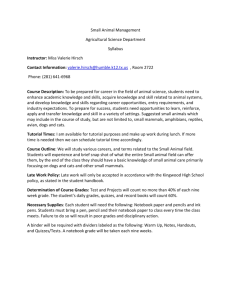
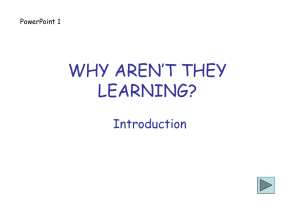
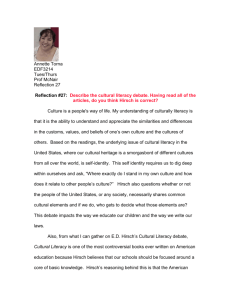
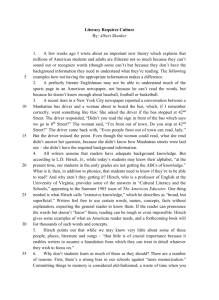
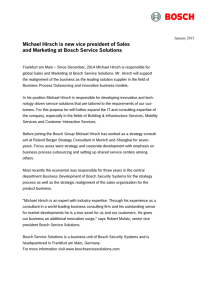
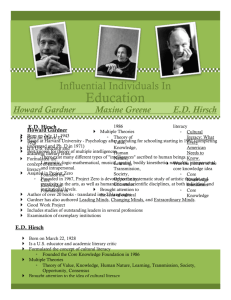
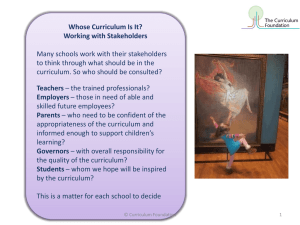


![afl_mat[1]](http://s2.studylib.net/store/data/005387843_1-8371eaaba182de7da429cb4369cd28fc-300x300.png)
